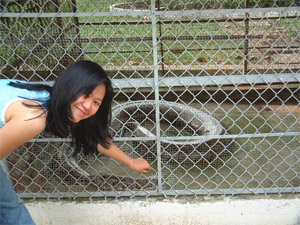
Learn How To Make Algae Biodiesel
Start Making Algae Biofuel In as Little As 3 Months

That's not me by the way...
My Story
Truthfully, I'm not even sure where to start, or what to say. Since this is making biodiesel books home page, I'm supposed to talk about myself, my life, my career, my books, etc. Seems kind of embarrassing or silly, truthfully. Or maybe I'm supposed to talk up my books and tell everyone how wonderful they are. But the unsolicited testimonials do that better than I ever could.
So how about the truth?

There were still some old downed Huey's left back in the day.
My name is David Sieg. I'm a biofuels consultant, writer, and now by default, internet marketer.
Here's the truth: There was nothing gutsy or glamorous about what I did, or what led me to this point in my life in biofuels. I did it simply to survive. At the time it didn't seem like I had any other choice.
Like John Lennon said, "Life is what happens while you're busy making other plans." So it was with me...
In 1995 I ended up in Vietnam to marry my wife. This was a few months before Clinton normalized diplomatic relations. Vietnam was just coming off massive embargoes of just about everything, but especially fuel. A regular day consisted of the electricity being off hours, even days, at a time. There was simply no fuel to be had. Even for public utilities.
Teaching in a concrete cinder-block box with no lights, no air conditioning, not even a working fan, was hell. Couple that with 100 degree heat and 100% humidity and you'll know why I lost almost 50 pounds.
I was first asked by my family, then by the university I was working at, if I could make biofuels. I'd never even heard of biofuels at that time. But the Vietnamese had. What started out as a way to get lights and fans working in my classrooms became first, an interesting hobby, then became a university class, then became a business.

A Python who decided to make our open pond his home.
As time went on, biodiesel led to algae biodiesel. In those days (1995-2005) it was just researchers and academics sharing information. these books started out as my class notes, they were expanded on, then textbooks I wrote for the school.
In 2008 that all changed.
Interest, first in biodiesel, then algae biodiesel, skyrocketed and went through the roof. Gas prices ballooned, "Peak Oil" was on everyone's mind. Big business jumped into the game and changed everything. Instead of sharing information, it was hoarding information. Instead of open source, it was secret. And I wasn't welcome around the big boys.
I guess I'm just not a corporate kind of guy. (Translation: I wouldn't kiss ass, or sell my soul for dollars.)
Little Did I Know the Sensation Making Biodiesel Books Would Cause...


"You have proven this is not complex. We can do it!"
”Dear David,
I am a small farmer that is suffering from the Economic downturn and would not have had the finances to afford it at this time. I believe your work in research on algae and your willingness to share with us maybe at the center of new world wide wealth for the under privileged. The greatest aspect of your work is the empowering of the little people. You’re making us aware we have other choices, we will no longer in bondage the big energy companies. You have demonstrated this is not complex. We can do this..”
It was time to get out, so I started making biodiesel books when I saw the handwriting on the wall, (2006) with the intent of sharing the information I had. It's now 10 years on. I've put a ton of information available on this website. More than any other website. I still continue to keep it up and plan on putting up as much info as I can for free.
People Ask Me, Why I Don't Share Commercial Secrets Here. Because Commercial (Exxon) Scale Algae Biofuels is Currently Not Realistic.
What IS PROVEN to work are small scale solutions. Localized Solutions...
Little did I know the sensation it would cause then. Ridicule, laughter, competitors calling me a scammer, even death threats for revealing the things I did. One book, (Making Algae Biodiesel at Home) became a massive bestseller.
Other books followed, and here we are today.
I'm Not Going To Insult Your Intelligence...
...by telling you this is some "secret" information. It's not. If you're prepared to wade hip-deep into the land of unintelligible techno-jargon, endless, mind-numbing government reports, or spend mega bucks, (Like I did...my competitors charge $600-$6,000, for the same information, have at it. I've seen people selling my own books on Amazon for over $1,000. You don't need to be here.
If you're a glutton for punishment, or like being numbed senseless with industry jargon, you can start here on my website. I've got THE BEST algae biofuels online library anywhere on the internet. Knock yourself out.
Here you'll find the information you need, when you need it. Put together in an easy-to-understand visual format. We've created original information and taken the best of the best from government sources, university thesis, actual case studies, and boiled it down to hard-hitting, no fluff info you can use today to start taking your energy future into your hands.
Don't believe people who tell you, you can't make biofuel from algae. All that means is THEY can't make biofuel from algae. Hundreds (Maybe thousands) of people are doing it right now, around the globe. With the knowledge on this website, YOU can make biofuels and bioproducts from algae. Small scale algae biofuels is the ONLY way to make algae fuels currently.
Is it as easy as going down to your corner gas station and filling your tank?
Nope.
I make no apologies for that. If you want easy, there's an Exxon station down the street. What you'll find at making biodiesel books is the cutting-edge of bio fuels technology. What you'll find on this website is what the biofuel consultants and what is now the "biofuels industrial complex", don't want you to know. Believe me when I tell you, they have a vested interest in keeping you ignorant. If you wanted to continue being an "Energy Slave," then you wouldn't have read this far.
If you're serious about making biofuels, either at home, or professionally, this website, making biodiesel books, can help you.
If you're a teacher, a prepper, want to go off the grid, a farmer, rancher, or overseas and needing inexpensive solutions, or just interested in creating biofuels, Making Biodiesel Books can help you.
In the age of internet crap and hyperbole, everything on this website is real. The testimonials are real The books are based on real-world experience, they it have been tested (And proven to work) in the biofuel trenches.
I personally believe algae can solve many of the world's challenges. From food, to fuel, to waste water treatment, to disaster relief, to organic fertilizers, to organic animal feeds, to organic health food supplements, to aquaculture, algae does it all.
Algae WILL BE a solution to 21st. century challenges.
It will Be Our Bible...
Dear sir:
Great news! You are finishing to write one book expected for many years. During several months, I have been an constant follower of your ideas, papers and designs and there is no doubt of your worldwide mastery about biofuels. I am a Colombian researcher dedicated to participate in the Colombian project for production of biodiesel from native microalgae…. It will be as our Bible on those topics really urgent and necessary for the future wellfare of the humanity.
Thanks in advance
UNIVERSIDAD PEDAGOGICA Y TECNOLOGICA DE COLOMBIA
We Need Small Scale, Localized, Solutions...
The powers that be want you dependent on them. They want you to depend on them for food, for energy and fuel, and money. In return you pay taxes and they give you the illusion of freedom. Dependence is slavery by another name. We can change that simply by taking responsibility for our own needs locally. Algae is the basic building block of food, fuel and energy, even medicines. With algae you can create everything you need to survive and thrive.
These days I still do biofuels consulting, mostly in the developing world, as well as grow algae for various applications at home, but I've also branched out into hydroponics and aquaponics as a natural outgrowth of algae-ponics, as well.
Lately, I've been into internet marketing as a means of sharing information. In addition to making biodiesel books, my other websites are Off-Grid-Living.com and Algae-Biofuel.com
Feel free to explore the site and add your own comments. By sharing information we all learn more.
All the best to you and your family,


This is my family and I on my son's third birthday. We currently live in the Midwest, USA.

